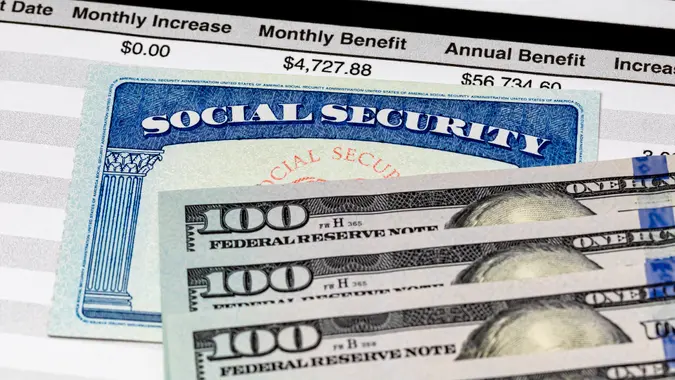Money Left on The Table: 3 Ways It Pays To Delay Your Social Security Benefits

Commitment to Our Readers
GOBankingRates' editorial team is committed to bringing you unbiased reviews and information. We use data-driven methodologies to evaluate financial products and services - our reviews and ratings are not influenced by advertisers. You can read more about our editorial guidelines and our products and services review methodology.

20 Years
Helping You Live Richer

Reviewed
by Experts

Trusted by
Millions of Readers
Choosing when to claim Social Security retirement benefits is a big decision. Experts say waiting can result in higher lifetime benefits, but most retirees choose to collect their checks early.
According to research from the Alliance for Lifetime Income, a majority of Americans claim Social Security retirement benefits before age 65. The earliest you can claim benefits is age 62, but full retirement age (age 66 or 67 depending on your birth year) is when retirees receive 100% of the benefits they’ve earned.
Claiming early could mean you’re leaving money on the table. Here are several ways it pays to delay your Social Security benefits.
You Get a Higher Benefit Amount
According to the Social Security Administration, you may receive up to an 8% benefit boost for each year you wait past full retirement age to collect benefits up to age 70.
For example, assume you’re 67 and are delaying benefits for an additional year. If your benefit amount is $2,000 per month at age 67, waiting until you turn 68 would increase your monthly benefit by 8% to $2,160. If you wait until age 70, your benefit could potentially be $2,480 per month.
You Get Larger COLA Increases
Social Security benefits increases are based on the cost of living as measured by the Consumer Price Index. These percentage increases are the same for all recipients, but the dollar amount you receive is based on your benefit, the Journal of Accountancy reported.
The COLA increase for 2024 is 3.2%. Those receiving $1,500 per month will see an extra $48, while someone whose benefit is $2,000 will see a $64 increase.
You Could Pay Less in Taxes
You typically have to pay taxes on your Social Security benefits. Income over $34,000 for a single filer and $44,000 for a married couple filing jointly can result in up to 85% of your benefit being taxes, Fidelity reported. This is called a “tax torpedo,” which is when your provisional income pushes you into a higher tax bracket.
Fidelity recommends delaying until age 70 and drawing down from your retirement accounts. This can reduce your adjusted gross income and potentially your tax burden when you claim Social Security benefits.
More From GOBankingRates
 Written by
Written by 
























